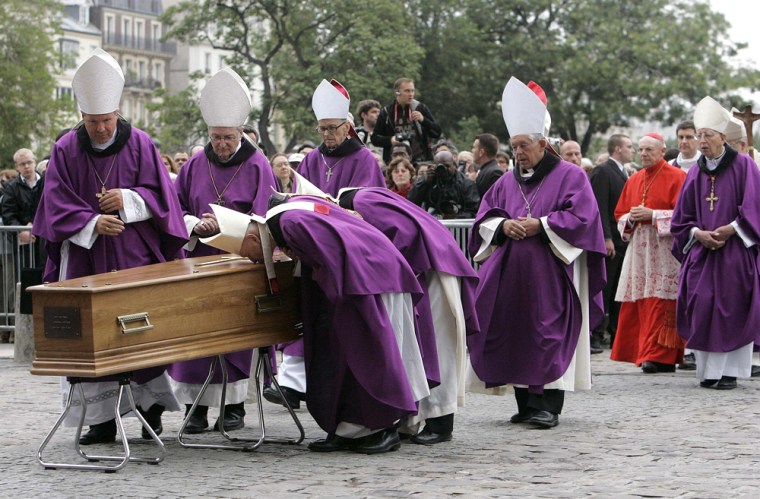Jews and Catholics joined in homage Friday, intoning a sacred Jewish prayer beneath the sculpted saints of Notre Dame Cathedral at the funeral of the Jewish-born Cardinal Jean-Marie Lustiger.
Lustiger, whose mother was killed at the Auschwitz death camp and who later worked to reconcile Catholics and Jews, asked that his funeral include both faiths. One of modern France’s most influential church figures, Lustiger died Sunday at age 80 in a Paris hospice.
Before his death, Lustiger asked that a commemorative plaque be placed inside Notre Dame reading: “I was born Jewish. I received my paternal grandfather’s name, Aron, I became Christian by faith and baptism, and I remained Jewish like the Apostles did.”
Hundreds of people, including prominent Jewish leaders of France, Holocaust survivors and French President Nicolas Sarkozy, gathered to see Lustiger’s simple wooden coffin carried through crowds and placed on the stone square in front of the 12th century Notre Dame.
Lustiger’s great-grand-nephew Jonas read a psalm in Hebrew and French and placed a bowl of earth gathered from Jewish and Christian sites in the Holy Land on the coffin.
“Today, when I close my eyes and think of you, I would like to simply say one thing: Thank you,” Jonas said.
Complex faith
An 83-year-old Nazi death camp survivor and cousin of the cardinal, Arno Lustiger, led the reading of the Mourner’s Kaddish, among a series of prayers central to Jewish worship.
The ceremony then moved inside the cathedral, where Lustiger’s successor as archbishop, Andre Vingt-Trois, led a funeral Mass. Despite the drizzly chill, hundreds gathered outside to watch the ceremony on a huge screen.
After the three-hour service, pallbearers carried the casket down the stone steps of Notre Dame into the crypt where other archbishops are buried.
One mourner carried a banner reading “Sons and Daughters of the Deported Jews of France.” About 75,000 Jews were deported from France to Nazi concentration camps during World War II; fewer than 3,000 survived. It was not until 1995 that then-President Jacques Chirac acknowledged the French government’s role in the Holocaust, a move Lustiger cheered.
Complex faith
Lustiger’s faith was complex — he never rejected his Jewish identity.
“He always claimed he was still a Jew, which caused a certain amount of anxiety and concern within parts of the Jewish community,” said Rev. John T. Pawlikowski, president of the International Council of Christians and Jews.
Rabbi Joel Roth, an expert on Jewish law at the Jewish Theological Seminary of America in New York, stressed that is it “not possible to be both Jewish and Catholic” and said it was highly unusual for the Kaddish to be read for a convert from Judaism.
Outside Notre Dame, mourners both Catholic and Jewish said they were not surprised by Lustiger’s unusual ceremony.
“Religion is such a personal thing — what matters is that you use it to do good, not bad,” said 60-year-old Serge Dahan, a Jew. Francoise Samborsky, a 56-year-old Catholic, added: “(Lustiger) was an original, and he was true to himself to the end.”
Lustiger was an important symbol in France, which is historically Catholic but where church is firmly separated from state and most people lead secular lifestyles.
In a sign of his significance, Sarkozy — who was raised Catholic but whose maternal grandfather was Jewish — interrupted his U.S. vacation to jet to Paris for one day for the funeral. The French president was to return to the U.S. for lunch Saturday with President Bush.
'He was a believer'
Lustiger, born in 1926 in Paris to Polish immigrant who ran a hosiery shop, was sent as an adolescent to Orleans, 80 miles south of the capital, to take refuge from the occupying Nazis. There, Lustiger, who was not a practicing Jew, converted to Catholicism at the age of 14, replacing the name Aron with Jean-Marie.
He was ordained a priest in 1954 and climbed up the church hierarchy until he became archbishop of Paris, a post he held for 24 years before stepping down in 2005.
Lustiger, a confidant of the late Pope John Paul II, opposed abortion and the ordination of women. He was also accessible and engaging. He created a Christian radio station, Radio Notre Dame, in 1981 and expounded on issues from the August 2003 heat wave that killed thousands of people in France to the building of a united Europe.
“Before all else, he was a believer,” Vingt-Trois said, adding that Lustiger undertook “decisive actions for relations between Jews and Christians that perhaps he alone could have carried out.”
